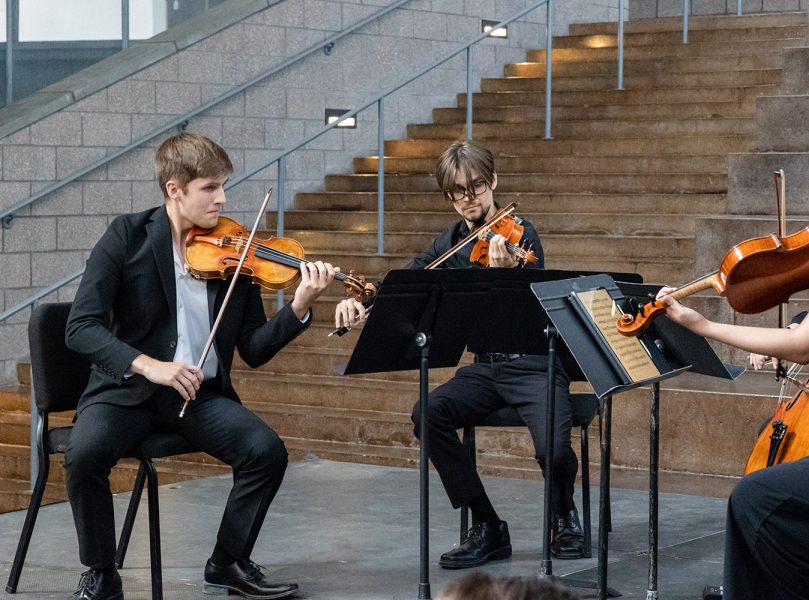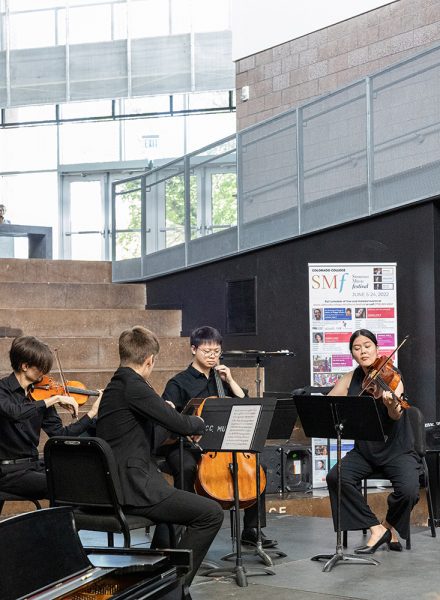NOTE: This article is by former Colorado Springs resident David Sckolnik, now of Palm Coast, Fla., who is a reviewer for the 2022 Colorado College Summer Music Festival. The 2022 Colorado College Summer Music Festival Concerts, many free, run through June 24: https://www.coloradocollege.edu/other/summermusicfestival/attend-concerts/index.html
—————————————————————————————
A funny thing happened on the way to Sunday afternoon’s Festival Artists Concert in Packard Hall, part of the Colorado College Summer Music Festival.
Across the street, at the Cornerstone Arts Center, 150 or so of the festival’s top donors were assembled for an appreciation luncheon. The festival fellows, 54 young professionals or conservatory students who come here to be coached and conducted, sat with their benefactors while small ensembles of their colleagues entertained with chamber music.
Over the decades since the festival’s founding in 1984, a definite trend has been established. While the faculty musicians have always been world class, the fellows keep getting closer to their teachers’ level of excellence. On this day, it was stunning to hear the high-quality playing of fellows such as violinists Theo Bockhorst and Elliott Davis; violist Lia Stallmann; and cellist Zac Fung. The foursome offered a jaw-dropping, professionally polished reading of the first movement from Beethoven’s “16th String Quartet.” This bodes well for the Festival Orchestra’s first full concert, Tuesday night in the same venue, when the fellows take their seats onstage.
Shortly after the luncheon, violinist Laura Frautschi, cellist Mark Kosower, and pianist William Wolfram took the Packard Hall stage for a little ditty by Franz Schubert, written in 1827, about a year before his untimely death: “Notturno in E-flat Major, Op. 148.” Even fans of the composer likely are not familiar with this 10-minute work.

Ever so gently, the artists began unfolding this piece of pure musical poetry, Wolfram stating the facts of the matter while Frautschi and Kosower brought silky sunlight to the hall. It seemed an easy exercise. But, in fact, the three musicians had to work intensely and engage in remarkable restraint to honor the architecture inherent in Schubert’s late work.
The result? I envisioned a beautiful valley with gentle warm breezes lifting the sweet fragrance of wildflowers while shadows were shifting as the sun crossed a sky dotted with cotton-like clouds. But that’s me. Superior performances of music, such as this one, free listeners to transport themselves wherever they fancy.
Next was another trio, this time with an unlikely combination of instruments—piano (Susan Grace), oboe (Robert Walters), and French horn (Michael Thornton)—playing a work by a mostly forgotten Late-Romantic composer: Heinrich von Herzogenberg.
It’s pleasant music in four movements, likely inspired by the alpine vistas of Central Europe and the chamber music of Johannes Brahms. The challenge here was to create a cohesive musical conversation despite working with diverse-sounding instruments. Thornton amazed by altering the tone and volume of his horn to match the vibrant, soaring oboe melodies produced by Walters. Grace acted as a masterful mediator until she, at last, was freed to unfurl some glittering keyboard excitement in the 11th hour of the finale.
If anyone’s enjoyment of that trio was undermined by its revisiting of a well-worn path, a welcome but shocking change was in store. “Chant de Linos” written in 1944 by André Jolivet is also unusually scored. Originally for flute and piano, this incarnation still features the flute (Elizabeth Mann) but replaces the keyboard with violin (David Kim), viola (Phillip Ying), cello (David Ying), and harp (Tonya Jilling).
This work was on fire. Led by Mann’s shimmering and soaring pronouncements, this was an ever-shifting ride as strings and harp jockeyed to realize the heart of the sentiment, resulting in a luxurious sound. Phillip Ying’s rich viola offered a soulful answer to Mann’s ongoing protests and high-frequency explosions. Jilling’s harp provided a dizzying
display of textures and seductive resonances. Tension from the ensemble had an ongoing ebb and flow, allowing Jolivet’s creation to become a living entity.
Even more unpredictable was the next work, James M. Stephenson’s “Vignettes,” first performed in 2005. Kevin Cobb (I lost count of how many instruments from the trumpet family he pressed to his lips) and Aiyun Huang (drums, triangle, marimba, xylophone, and attack tamborine) cycled through these energetic vignettes with suggestive titles (“Chasing Igor,” “Waltz in Berlin”), presenting ever-changing sounds, tonality, and form. There was no way to know what could and would be next. Add to this an entertaining dose of theatricality, and this short episode of the concert, for many, was likely the most enjoyable of all.

The afternoon’s final destination was Brahms, his “Clarinet Trio in A minor, Op. 114” written in 1891. It is one of a series of sublime late works by the composer, inspired by his admiration of clarinetist Richard Mühlfield. Taking up the mantle of this legendary musician was festival stalwart Jon Manasse. Joining cellist David Ying and pianist William Wolfram, the clarinetist offered an organic sound that was excruciatingly beautiful.
Being Brahms, this music was filled with complex textures, thought-provoking structure, and heart-wrenching melody. In lesser hands, the experience can regress into a competition among the instruments. Not here. With only a few days of rehearsal, Ying, Wolfram, and Manasse were able to make the appropriate choices so that the three instruments sounded as one.
One can listen to umpteen recordings of compositions performed by legendary artists like this trio, but a transformative live performance can unearth revelations not previously considered. This trio exposed an argument in the opening Allegro met with prayer and blessing in the Adagio. The ensuing Andantino grazioso danced in a dream state saturated with nostalgia, leading inevitably to the Allegro finale and a brilliant explosion of sound to take us home.
Manasse’s sound has already been noted here. It never left its golden orb, no matter how aggressive the score got. Brilliantly, Ying played what sounded like two instruments: a cello providing the bass of the soundscape and a cello asked to match up with a clarinet in its high register to create a cogent melodic dialogue. The third instrumentalist, Wolfram, is a pianist with the rare capacity to change the sound and energy of a seemingly static instrument. All of these musicians’ abilities assured this performance was engaging and profound.
For audiences and artists, classical music recitals typically are marked by convention and restraint. On this afternoon, someone forgot to issue a reminder, and the Faculty Artists were observed having more fun than anyone, unable to control their joy at the opportunity to share their talent and enthusiasm with their colleagues and our community.